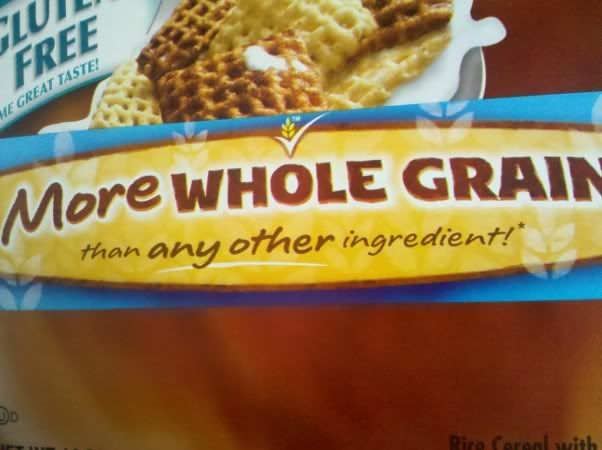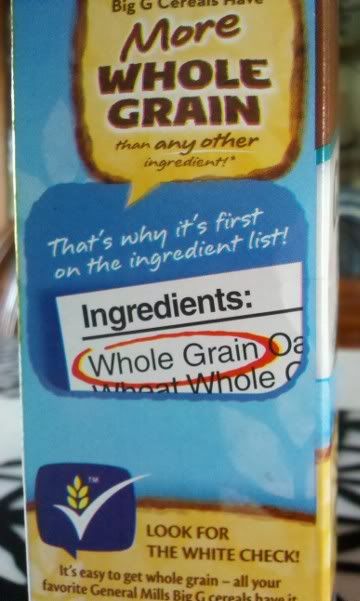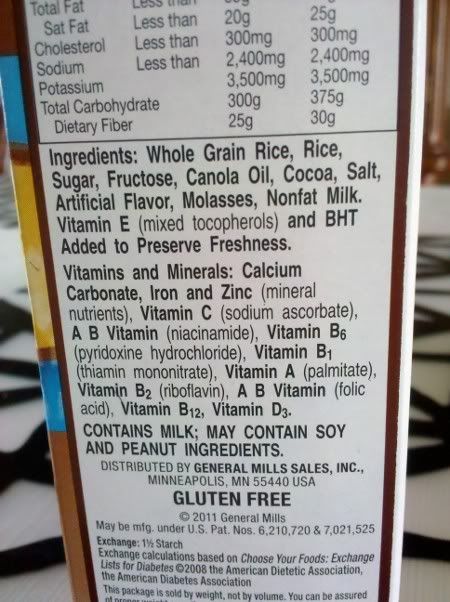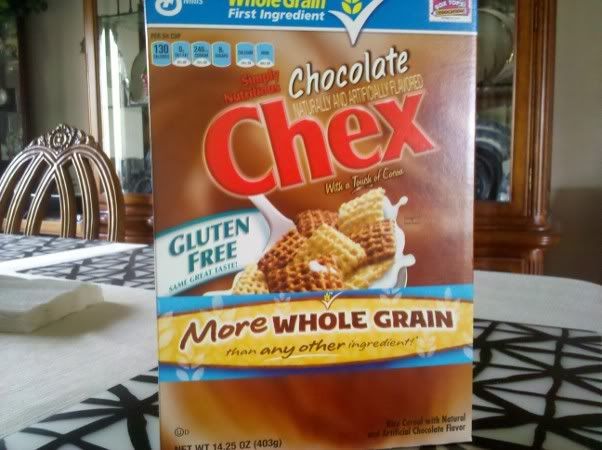And I'm sitting there, nomming my foods, just glancing over the box, when this catches my eye.

More whole grain, than any other ingredient. Noticing the "*", and being the analytically minded person I am, I started turning the box all around until I spotted this.

It's just a statement that restates what most of us already know about ingredient labeling. Ingredients are labeled in order based on the amount in the food. Okay, so General Mill's Chex cereal has Whole Grain as the main ingredient. This is pretty much a given for Chex cereals. So at first I'm like, "okay, no big deal, they're just making sure people see that on the front of the box instead of relying on them to turn to the ingredients listing."
(By the way, I recommend always checking the ingredients on everything you buy. Always.)
But then I looked at this again, and in a new light. They're not just making sure people can see the main ingredient from the front. Look again at the first and second images. At a distance, the word "ingredient*" is hard to even spot. Close up, it's still very small compared to all the rest of the text. And when you look at the area where they explain the footnote "*", it's not only on a small side, but it's in even smaller text.
General Mills is not selling on the premise that their food uses whole grains as the main ingredients (which, by the way, can mean even less than 50%, so long as there's more "whole grain rice" compared to "regular rice").

General Mills is selling on the unclaimed premise that their cereal has "more whole grains than any other," cereal.
That's shady, GM. That's shady.
If it wasn't so damn tasty, I would boycott.
And I totally see what you did there.
(By the way, I recommend always checking the ingredients on everything you buy. Always.)
But then I looked at this again, and in a new light. They're not just making sure people can see the main ingredient from the front. Look again at the first and second images. At a distance, the word "ingredient*" is hard to even spot. Close up, it's still very small compared to all the rest of the text. And when you look at the area where they explain the footnote "*", it's not only on a small side, but it's in even smaller text.
General Mills is not selling on the premise that their food uses whole grains as the main ingredients (which, by the way, can mean even less than 50%, so long as there's more "whole grain rice" compared to "regular rice").

General Mills is selling on the unclaimed premise that their cereal has "more whole grains than any other," cereal.
That's shady, GM. That's shady.
If it wasn't so damn tasty, I would boycott.
And I totally see what you did there.


GM uses Monsanto products (Modified seeds, herbicides and pesticides) You say look at the ingredients in what you buy, but its even more important to look at they entire product and company you buy from.
ReplyDeleteMonsanto makes hybrid seeds which have been altered to actually have pesticides INSIDE the seed and plant. Which has been known to transfer right into the food product and the toxins have been found in humans.
Most major companies like General Mills, Betty Crocker, Marie Calender, Green Giant and the like use Monsanto products.
It is nice to look at the ingredients in what you buy, just like you would for pets. But even if it has corn, rice, or wheat as the large part of the product like a 'good' food would have, it's still a toxic ingredient, tainted by hybrid seed and unnatural, non-organic items.
Shady GM is a lot more shady than you can imagine.
Oh I already knew about the GMO's unlabeled in their products. The simple matter is that until some change is made in legislation, it'll still be in there, quietly. It won't matter if everyone starts screaming and yelling, because while people say they'll boycott, how many will go through with it? I'm in the USA though, so attitudes elsewhere are different, but most people won't want to change their likes and habits until they have definite proof in their hands. -And even then, some would still eat it.
ReplyDeleteUnfortunately this is the case with me. I'd like to boycott GM and other brands that are well known for using GMO's in their food, but simply put I can't. I can't afford organic veggies, organic fruits, or top-shelf cereal. And because my sense of taste is so fixed after eating this stuff for literally 30 years, there's only certain items where I can tolerate the "bottom-shelf" taste.
So... I just sigh and forget about unlabeled GMO's for a while. I'll focus on the shady labeling that gets around currently established laws (I belive it's the FDA requirement about labeling "whole grains" only when they're in there in significant amounts).
I don't know. In the US it has to be done one small step at a slow time. Work out Saturated fats first, now working on HFCS, maybe unlabeled GMO's will be next?